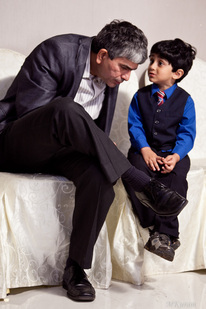|
By Joyce Suttin
Bo was our golden lab who loved to swim in our pool. He lived for his exercise, and the pool was his domain. One day, my son was learning new strokes and tried the dead man’s float. Bo decided his boy was in imminent danger and jumped into the pool to rescue him. Instinctively, he pushed my son’s head up and held onto him with his paws in an effort to save his life. My poor son choked and sputtered as he tried to keep Bo away and ended up with water in his lungs and a chest full of scratches. I praised Bo as he shook water all over me in his zealousness to get my opinion of the event. I knew that he’d accomplished more harm than good, but I could relate, because I know I’ve often done the same thing in my interactions with others. I was talking with someone the other day about their relationship with their teenager and offered my advice. After forty-some years of parenting, grand-parenting, and teaching teenagers, my wisdom was really quite simple: “Don’t take things personally.” It’s hard not to react with annoyance, anger, or sensitivity when you feel like you are being rebuffed. It’s hard not to take unkind words or actions personally, not to think of all the times when there were other things you wanted to do, but you stopped and listened and attended to your kids’ needs. It’s hard to stand on the edge of the proverbial pool and watch and pray, knowing you have said all that needs to be said and done what you could. Now is the time to just step back a bit and let them try. Let them make the clumsy dive. Let them try the new strokes. Let them imitate their friends. But don’t jump into the pool like Bo and try to rescue them prematurely. Just watch and wait in case they call for help. And pray. Because in the end, prayer and unconditional love are really what will make a difference. If they eventually call out to you, don’t berate them for all the times they didn’t. If they knock on your door, don’t tell them you’re too busy. Be the anchor. Be the rock. Be the stable place in the unstable world and let them know that things will be all right. Then treasure that moment with your arms around them again, and give them faith to jump back in the pool. Joyce Suttin is a retired teacher and writer and lives in San Antonio, USA.
Text and image courtesy of Activated magazine.
0 Comments
Teenagers and young adults are especially vulnerable to substance abuse and getting addicted. Early intervention by parents, family, and educators can go a long way. However, many parents get confused when they learn their kids are using drugs and have no clue how to proceed. If you or anyone close to you is having trouble with a struggling teen, this guide has everything you need to know.
Read more  Dr. Bob Pedrick Coming home from college was usually a joyful occasion for Peggy Painter. But this time she felt a stomach-knotting fear, and each step from the bus stop deepened her anxiety. Peggy's parents were Christians and generally understanding. But the story she had to tell of an unwanted pregnancy, ended by abortion, would both shock and sadden them. Would they hear the anguish in her voice? Would they recognize all she had gone through? Or would they, in their own pain, lash out and condemn her? Peggy's story has a happy ending. Her parents listened. They heard; they felt. And their response showed that they understood her feelings and accepted her. For Peggy, it meant the beginning of a new life. Peggy's parents not only rekindled her smothered life but focused attention on her future opportunities rather than past failures. They exhibited what we call responsive listening--a process of listening with a person, not just to or about him. Responsive listening restrains the temptation to judge or give advice. Responsive listening helps a person clarify and communicate his feelings. It creates a climate of understanding, reduces defensiveness, and clears the way to positive changes in behavior. "I Want to Understand You" Responsive listening is not an easy skill to acquire. It takes practice. It means attaining some verbal dexterity. More important, it begins with a caring attitude. Responsive listening presupposes that parents really want to know what their children have to say. It does not necessarily mean agreeing with them. Rather, it is an attitude in which a parent says, "I want to thoroughly understand--and let you know I understand--what you say before I respond." Once the parent understands the message, he has the option to agree or disagree. The effectiveness of our hearing apparatus may get us into or out of trouble, but we're not talking about hearing. Listening is something else. Listening is how we comprehend and react to what we hear. Through extensive research, Xerox Corporation has discovered that most people operate at an efficiency level of only about 25 percent in general listening situations. If similarly low levels of attentiveness are typical of family relations, then many crises may well be traced to poor perceptions of what someone else said. Usually when our children come to us, we respond with some kind of verbal or nonverbal message, but the messages we send often do not achieve the desired results. As a result of his experience with parent training courses, one researcher found that over 90 percent of parental responses to children fall into one of twelve nonproductive categories: 1. Questioning 2. Judging 3. Lecturing 4. Ordering or commanding 5. Warning 6. Name calling 7. Sympathizing 8. Probing 9. Preaching 10. Advising 11. Agreeing 12. Withdrawing These twelve response categories often reap undesirable results, although there are always exceptions to this general rule. Children, parents and situations vary and cannot be handled in a "rulebook" fashion. Many times, however, these types of responses not only illustrate parent-child dialogue today but are similar to the responses Job's "comforters" gave him several thousand years ago. 1. Questioning: Bildad answers, "Who are you trying to fool? Speak some sense if you want us to answer!" (Job 18:2). Such unnecessarily aggressive questioning often triggers rebellious thoughts and behavior. 2. Judging: Eliphaz answers Job, "It is because of your wickedness! Your sins are infinite!" (Job 22:5). Such commonplace judgmental statements, if made to our children, can breed exaggerated attitudes of guilt, which can become permanently imbedded in their personalities. 3. Lecturing: Again Bildad tells Job, "Read the history books and see--the wisdom of the past will reach you" (Job 8:8,10). Lecturing often makes the unwilling recipient feel inferior, inadequate, or resentful. The good-old-days syndrome illustrated here is especially destructive to good family communication. 4. Ordering or commanding: Now Zophar replies, "Stem this torrent of words. Is a man proved right by all this talk?" (Job 11:2). Or, "Shut up!" If repeated often enough, this command can destroy mutual respect. 5. Warning: Bildad warns Job, "Your bright flame shall be put out" (Job 18:5). A warning is all too often an invitation for a child to test the firmness of the parent's resolve. Do you really mean it? The child will soon find out. 6. Name calling: Eliphaz taunts Job, "You give us all this foolish talk. You are nothing but a windbag" (Job 15:2). Want to destroy a child's self-image quickly? Start calling him names. The Parents Zone, Web Reprint, adapted Generation means all human beings born and living around the same time; also known as coevals. When there is a significant gap of time between two coevals, it is defined as “generation gap.” When we compare two generations and when there is a considerable difference in the lifestyles, habits, likes, and dislikes of the people belonging to these two separate times, problems due to age gap arise. It is no secret that this gap is widening rapidly. More and more parents and their offspring agree that they just can’t understand each other. This lack of understanding of social, moral, political, musical, or religious opinions leads to lack of acceptance, which is one of the primary reasons why families break. Here are a few tips for parents to help bridge this ever-widening gap: 1. Communicate constantly. It is simply a fact that communication plays an important role in bridging gaps between not only parents and children, but also in every relationship that we can think of. When we communicate respectfully with our children, we are letting them know that we are willing to do all it takes to lessen the age gap and understand things from their point of view. 2. Be open minded. Open mindedness means widening our horizons. When we widen our horizons and we open the doors and windows of our heart, we look at things with a new perspective. This helps us understand why what is being said is actually said. This is very important if we want to understand our children’s priorities and habits. 3. Learn to accept. Trying to understand our children’s world is no mean task. It takes a lot of effort to understand the younger generation. We have to accept first that we lived in a different world. For us, that was an ideal world, with less corruption, hypocrisy, cheating, and every bad thing we see so much increased now. Then, we will have to accept today’s times too, especially the fact that not everything is that bad, and make the effort to understand and accept our children’s perspectives and priorities. That is a big step towards bridging the generation gap. 4. Listen and understand. We as parents sometimes tend to talk too idealistic. We will have to stop that, and we will have to learn to listen, and then to understand. Giving lectures is not at all a good idea. 5. Silence is golden sometimes. Yes, sometimes we have to learn to be silent too. We have to let our children voice their opinions and listen to what they are saying, without interrupting them. In conclusion, the reality of a generation gap is only in terms of age. If we set our egos aside and look at things from an entirely different perspective, we can minimize the gap between our children and us. This does not mean we should not do what we need to do as parents. It just means we become a little more understanding and accepting of what our children see as “their world.” Courtesy of Motivated magazine. Used with permission.
 Perseverance pays Young people can drive you up the wall at times! But keep trying to reach them and relate to them. Try to get on their level and be one with them. If you can develop a link, a connection, then you can start getting through to them and making some real progress. Frustration is the price you have to pay when you work with young people. That’s just the way it sometimes is; that’s just a fact of life. Your knowledge and experience comes from years of ups and downs, successes and failures, and quite a few trying situations, whereas these teens are just starting out. Keeping that in mind will help you to have patience. Also, try not to compare this group with other teens you have worked with; some kids are slow at wanting to grow up, others are quicker. You can’t let yourself get overly frustrated about these things. Let them break the mold As young people grow up, they generally need more freedom to make their own choices without someone trying to fit them into a certain mold. Some people just don’t and won’t fit into the mold you try to put them into! You’ve got your mold, you’ve got your idea about how they should be or act, but you can’t expect even your children to be that way, to be just like you and totally conform to your ideals. You may need to start changing your perspective. You may need to change the way you look at these young people, and start looking for things that you admire about them—for how well they do in spite of the pressures and difficulties they face. Be willing to get your hands dirty Don’t give up! Just get in there and don’t worry about getting your hands dirty. It is a bit like gardening—you can’t really be a gardener unless you are willing to get your hands dirty. Plants aren’t going to thrive or grow if all the gardener is willing to do is just watch them and water them. Sometimes plants need re-potting because their roots are getting too long and numerous for the pot they’re in, or the soil they are in needs to be changed because it has lost its nutrients or is getting moldy. So it is with growing young people—they may need some personal attention from someone who isn’t afraid to get right in there and help them find solutions to their problems. Sometimes they get tangled up and just can’t help themselves, and they need the help of the gardener. Watch out for them like the gardener watches out for the warning signs—leaves turning yellow or getting spotted or drying up, soil getting moldy or plants drooping from insufficient water. There are shade plants, and there are sun plants; there are plants that need a lot of water, and there are others that hardly need any. There are plants that need much care and have to be misted daily. Then there are cacti that hardly need any care. Your part is to just be a faithful, loving, caring gardener—to keep your eye on those plants and do what you can to help tend and care for them. The gardener learns what he can do, and does what he can to help the plants. And like any gardener, you can only give it your best, then you must leave the rest up to God. Excerpted from “Parenteening”, by Derek and Michelle Brookes. © Aurora Productions. Photo by Kristin via Flickr.
By Beverly K. Bachel, adapted Most of us think about what we want to accomplish and set goals for our lives. But are our kids doing the same? It’s fun for kids to imagine the amazing things they might achieve someday—but are they doing anything right now to make their dreams come true? There’s no better time than the present to help our kids become real goal-getters. Anyone can learn to set goals, and research shows that kids who set goals feel better about themselves; have increased motivation; get better grades; and are more satisfied with their lives. Here are 10 tips to help kids get on the goal-setting track and into the fast lane to reaching their dreams: 1. Make them SMART. Make sure kids’ goals are:
Not-so-SMART Goal: “Get an A+ in math.” SMART Goal: “Boost my math grade by at least one letter by the end of the semester.” Not-so-SMART Goal: “Get a new bike.” SMART Goal: “Save up for a new bike by the end of the year.” 2. Write them down. Have kids write their goals and the date by which they want to achieve them on a piece of paper. Have them post it on their wall, on the computer, on the refrigerator, or somewhere else where they’ll see it often. 3. Think positively. Attitude is everything when it comes to kids’ future success. Help them make a list of their good qualities, remember compliments, and appreciate what they have. Also remember that if kids see a good example of a can-do attitude, they’ll be more likely to think positively. 4. Find time. Help kids cut down on time wasters, like watching TV, surfing the Internet, or talking on the phone, so they can free up time to focus on their goal. 5. Take 10. Set a kitchen timer or stopwatch for 10 minutes and encourage kids to use that time to work on their goals. They may find themselves motivated to keep working on their goal even after the 10 minutes are up. 6. Give a reward. When kids take a step toward their goal, reward them with a movie, their favorite meal, a weekend off from their chores, or another affordable incentive that will keep them motivated. 7. Visualize success. Minds produce what they dwell on. If kids see themselves reaching their goals with ease, they’ll be far more likely to succeed. Ask questions at dinner or while driving them to school to get them talking about their goals. 8. Set “anti-deadlines.” These are the opposite of rewards. Have kids tell themselves, “If I don’t do it by 5 p.m. I can’t go out with my friends tonight.” 9. Ask for help. Let kids know they don’t have to do it alone and that people in their lives (family, friends, teachers, coaches) will want to help in whatever ways they can. Offer to introduce them to a role model or take them on a field trip to learn more about a career they’re interested in. 10. Be a role model. If we talk to kids about our goals and the steps we take to accomplish them, and they see us following through on our commitments, they’ll be more likely to do the same. Article courtesy of Motivated magazine. Used with permission.
Q: My teen daughter says I should just leave her alone to live her own life, but I am very concerned about where her life seems to be heading. She seems to have so little self-control. What can I do? Keep being there for them and ride out the storm Many young people have little willpower or self-control, mainly because they don’t see any reason for controlling themselves. They just like to let it all hang out; they don’t see why they shouldn’t. They are grappling with their myriad desires, feelings, and emotions, and it almost involuntarily spills out all over them, and all over others. Some young people can handle it better than others. And some don’t really see any reason for controlling themselves at all. They like to have fun, they like to be entertained, they like to be independent, they like to do their own thing. They want to be different, they don’t want to conform, and they don’t see what is wrong with being a little rebellious, being a little ornery. You’re just going to have to help them along the path. You’re going to have to show them the way, guide them, point them in the right direction, keep steering them back on the right track. Keep doing your part, and eventually they’ll come around and even start to see the wisdom in the things you say, in the advice and counsel you give. You just have to ride out the storm and keep being there to help them through this period when they sometimes seem more like an ugly caterpillar than the beautiful butterfly they are becoming. Typical teenhood Your daughter is a pretty typical teen. She loves to have fun and play around. She doesn’t like hard work just yet, but what teen does? The teens who are mature and serious about life are rare. Most are inclined to be closer to the opposite end of the scale: frivolous, foolish, fun-loving, lacking in discipline, lacking self-control. Yet deep inside they do crave guidance, instruction and counsel. Their pride won’t always let them receive it so gracefully, but they do know they need it. Your daughter knows she needs to be kept on the straight and narrow, and that she just can’t control herself. She knows she gives in too easily to things she shouldn’t. * Teens have many fears. Knowing that you know they are being hit with crazy thoughts is a comfort to them, because they don’t feel so odd or isolated. * Young people may be overly-demanding or intentionally annoying just to get your attention. Try not to overreact, but instead focus on trying to get them to understand the situation and why you are not able to meet their demands at the time. Appeal to them for their much needed help and cooperation. * Thrill-seeking teens like to shock or worry their parents by their wild actions. Sometimes they feel they don’t belong, so are seeking more attention from you or their peers. Love them for who they are, and let them know they don’t need dramatic extremes to get your attention. Excerpted from "Parenteening" by Derek and Michelle Brookes; © Aurora Productions.
Words are not the only way to communicate your love and win your teens’ trust. There are a lot of other ways. Try to catch their eyes. Use your eyes to show them your love. Don’t give them an accusatory or hurt look which probes for guilt or wrong—but give them loving, understanding, encouraging looks. Let them hear by the tone of your voice that you do love them and you do understand. Actually, it is not how much you communicate with them but that you do communicate with them. Try to touch base with them in some way each day—via a look, a touch, an encouraging word—then build on this. It will grow! Give them the help and support they need. At this age they are very insecure and feel like they are being tossed on a troubled sea. They are looking for the lighthouse. Be their beacon! They can count on you There will be times when you will have to lay down the line and be firm with your teens as you guide and correct them, but as they grow, you will have less of a direct influence over their lives. Your role will change from their parent to their friend—not an “anything goes” friend, but one who loves them enough to be honest with them—someone they can count on, someone who is more a helping hand than a judge—someone they can lean on, rather than someone they have to avoid or hide their life from or try to get around. Help them know they can really count on you. You build their confidence in you by being faithful in all those little things that add up in their mind to the kind of person they believe you should be. If you’ve made a mistake and flown off the handle, if you have been too extreme with them, if you have scared them off or driven them into their own world, then go to them and apologize. Explain that you want to change and you want to be different. If you are humble and you show that you know you have weaknesses and need help in many areas too, then even if your teens don’t show it, they will have seen you put your heart on the line and trust them with a sensitive part of your life, and this will encourage them. They do need your help, they want your help, but they want it on their terms—when they want it and how they want it. Of course, sometimes when they are in trouble and you see they are in trouble, you do need to intercede. Go to them directly and explain the situation as you see it. Communication alternatives If your teen doesn’t respond to your efforts to communicate, perhaps he (or she) just isn’t able to talk to you face to face, especially if you aren’t very good at controlling your anger or emotions, and therefore they’re afraid of how you might react. If this is the case, then encourage him to write you a note, or to record his thoughts on a tape recorder or dictaphone, and give you the tape to listen to. That way you can “hear” him out without him experiencing your initial reaction head-on. You have time to think things over, he has time to think things over, and you can have a discussion later in a calmer frame of mind, or answer him in a note if you like. Guide rather than intrude Young people are unsure of a great many things, and so sometimes they jealously protect the “garden” of their lives from intrusion. They are not sure which are the weeds and which are the good plants, but they are sure they do not want you stomping into their life and pulling out what you think are weeds. They want to make those decisions for themselves. They may like to have your guidance, but constant intrusion into their lives is not usually what they want. Love despite silence A parent should try not to be put off by silence. Keep putting your heart into talking and communicating with your teens. Give them a few signs of affection—a hug, a kiss, a touch or pat, an expression of warmth. Just let them know you are there, that you care, that it is okay, you are listening, you are watching out for them. All these help them feel more secure, even if they do not openly admit it or react as if they do. Sometimes they do not want to react or show too much weakness to you, because they know that will bring out the parent side in you and put them right back in the role of being children. Cherish your moments together Keep reminding yourself that your teens are growing up and may soon go their own way, so the moments you have together are precious and should be positive and memorable ones you can all look back on and cherish. Don’t fight over trivial matters. It is just not important. Even if you think it is important to have an argument about something—stop! First try to love them. Show them love, even in a storm. Love never fails! You may be very upset, but they are likely worried and confused too. Arguments fail! Expectations fail. Giving orders fails. But love never fails. Try to get past your anger. Try not to be too set in your ways and too predictable in your negative reactions. Only be predictable in your love for your teens. If they are secure in your love, this will be a good foundation upon which problems can be worked out. Stay open, approachable and give them opportunities to talk to you. Step back! Let them breathe! Surprise your teens by making changes—changes in your life and attitude and way of looking at things. Surprise them with all kinds of interesting differences. Young people want to be proud of their parents. They want to feel that their parents are cool, but even more than that, they are looking for something warm, supportive and understanding in you—someone who is there, right there praying for them, standing beside them—not like a blanket suffocating them, but like an umbrella protecting them. If you are the type of parent that likes to take control, that grabs the pencil away from them to show them how you’d do it, then you must learn to let go of that desire for direct management of their lives. Step back! Let them breathe. They know what you believe. By now you have certainly told them enough times. Just turning up the volume now, yelling at them, or forcing them, or being harsh or critical or negative, or speaking as though you expect the worst, is the worst and will get the worst results. They may just tune you out and stop listening. Their life is sacred. It does not belong to you; it belongs to them. And there comes a time when you have to move back and give the controls to them. Let them row their boat. Let them learn to drive the vehicle of their life. But be there to help, and encourage them as they learn. Don’t be too quick to grab the controls away from them. It’s too late for that. They’re growing and they’re going to be venturing out on their own whether you like it or not. It is hard to step out of the role of their boss, but you must. However, do not go to the opposite extreme and become so passive and detached they think you just don’t care. Step back and into the role of friend, supporter, cheerleader, avid fan, admirer, the one who believes in them, the one who loves them unconditionally even when they don’t reach their expectations—or yours. Show positive expectations It’s unfortunate, but young people often act out your negative expectations. It’s better to try to show positive expectations and hide your disappointment. Positive expectations move them toward the good and convict them when they do wrong, because they don’t want to disappoint you or cause you to lose faith in them. On the other hand, if they feel your negative suspicions, accusations or assumptions, they may tend to go that way. (Simply put, it is easier to be bad if someone expects you to be bad, but it is easier to be good if someone believes in you and expects you to be good.) See mistakes as steppingstones Everyone makes mistakes. Parents can’t expect saints from sinners like themselves. Let your teens know that you’re a sinner too, and you also have to learn from your mistakes. Young people make a lot of mistakes, and they feel bad about them, but don’t rub it in. Try to help them be glad for the chance to learn such valuable lessons early in life. Look for the good that can be drawn from each situation, and help them look for the good. If you look for the good in everything, including them, they will see a lot of good in you. Let them row their boat while you cheer them on Try to help and encourage your teens in those areas that are strengths in their lives, but don’t push too hard. You might want them to have a certain education or special training; you might want them to have what you missed. But there comes a time to put aside your ideas and look at what your teen wants and is able to do. Pushing can be perceived as overriding her will and her rights. Your idea may be the best for her, it may be her area of talent, but she likes to feel it is her choice what talent she wants to develop, a part of her inner joy and development. It is hard to change your teens without changing yourself. There may seem to be no way to break through to them. They know you too well as their parent and have their guard up to protect themselves from your “parenting.” But when you come to them as a friend, they will not be as closed. If you approach them as someone who loves them and cares for them, as someone who sees them as a person, that is what they want. That respect, recognition, support and understanding means a lot to them. Those are the building blocks that make them more secure in their march to manhood or womanhood. Excerpted from "Parenteening" by Derek and Michelle Brookes. © Aurora Productions. Photo courtesy of Activated! magazine.
 Q: I feel that something is wrong, but my teen won’t tell me what is the matter. I wish I could believe that he is being honest with me. What can I do to encourage him to come to me and tell me his problems? How do I help him know I love him no matter what, and that he can be honest with me? Grow together if you don’t want to grow apart To be gradually closed off and then locked out of someone’s inner life, a child or friend with whom you once enjoyed closeness and communication, can be very painful to endure. Many parents experience this as their children grow and change. There comes a gradual dividing of the ways, a parting. But it doesn’t necessarily have to be a painful parting. Parents and their children can learn to grow together, rather than apart. This takes a great deal of communicating and understanding, plus give and take by the parents and their teens. On their part, parents must continually upgrade their thinking, reevaluate their relationship and try to perceive the new emerging person that their child is becoming. Their child is changing, developing, growing before their eyes. Keeping up with the growth and change in a young person can be very challenging. It is not just a matter of physical changes and hormonal changes, but there are many other deep emotional, mental, social and spiritual changes taking place as well. To keep in step with a teen, parents must constantly be reassessing their relationship and looking for new insight and new ways to relate to him or her, and develop a new set of expectations. To keep up with a changing young person, you have to adapt and change right along with him or her. Adjust your role as they grow Your relationship with your teen can’t remain a parent-child relationship; it has to change to a parent-friend or a friend-to-friend relationship. You must let go of your parent role somewhat if you want to get through to and communicate with your teen. Your young person must feel that you understand him or her as a person. In the eyes of your teens, individuality and independence come to them through breaking out of the parent-child relationships they had with you. They feel they need to break out of this mold in order to grow and become independent, thinking people. Parents who want to keep the parent-child relationships as they are, who want their children to remain subject to them and their ways, will find it increasingly difficult to communicate with their growing, changing “children.” Upgrade your approach and programs The key to keeping up communications is to keep up to date with what is happening in the lives of your children. Be aware of their activities. Pop into their world to see how and what they are doing. Do things with them that they like to do. Be considerate of them. Keep reevaluating and deepening your relationship with them. Keep monitoring yourself as to what you are doing with them and how often you spend time with them. How are you treating them? How are you talking to them? Effective parenting is like a computer program which must be upgraded often to effectively meet changing and more challenging needs. Young people provide these challenges, which always put the “latest versions” to the test! So the parents who want to communicate best with their children must take the time to keep up with their needs. You can’t just remain as you are, where you are. You have to keep upgrading to keep up with them. That’s a lot of work, and it requires an investment on your part. Keep in tune, keep on top of your teens’ situation, and be familiar with what goes on in their lives. If you just don’t know, then stop and take the time to find out. Build a common understanding Sometimes teens’ lack of communication is because something is wrong or because they’re not being honest with you. Often it is not having a lot in common anymore that keeps young people from communicating with their parents. If they think there is little in common, then they think you won’t understand them. There are many ways to build a common understanding. For example, show an interest in the age group your child belongs to. Asking your child to help you understand his or her age group can help lay the groundwork for deeper and more personal communication. Ask sincere questions and let your child explain why things are as they are, why his or her age group feels, acts, or dresses in a certain manner, or whatever. If your teens see your motives for asking as coming from a true desire to understand them, they will feel honored that you recognize them as unique individuals, and that you believe they can help you understand. Often in explaining something to you they come to understand it better themselves. Avoid expressing very strong opinions at these times of building communications. If you feel you must give your opinion, then try to state it as dis-passionately as possible, leaving lots of indications that the door is still open for further discussion. Avoid passing judgment or laying down laws during these times. Just focus on trying to understand your teen and communicate. View your teen as a “person” Seeing you reaching out, trying to understand, and even asking them for help, makes your teens feel more mature, and that they have a special place of importance in your life. They feel good when they see that you view each of them as a “person” and respect each one as someone with insight and understanding, someone who can be called upon for help and counsel. They see you do not think of them as just your children, but more than that—as friends. Showing a young person respect is very important in laying a foundation for communication. When your teens feel you respect them, they feel they can trust you with the more difficult or personal matters or situations they face. Earn their confidence by being confidential Young people gauge how you will likely react to them by how you react to others in a similar situation or with a similar problem. How they see you react tells them if it is safe or not to approach you about something. It tells them what they can do, or at least what they can’t let you find out that they are doing. Young people like to know that what they tell you is said in confidence—that you will not blab it around, or talk about it with others—especially those they do not want told or those they don’t have the same confidence or trust in. If they entrust a bit of personal information about their life with you, they expect you to guard it and keep it in confidence. It is very important to respect their trust in you and not carelessly repeat things they have told you in confidence to others who do not need to know or be involved. It may seem like a small matter to you, but they will not see it that way. When to hold back on getting actively involved When young people do share a difficulty they are going through, parents sometimes want to rush in and take control and help solve it for them. But that is usually not what they want you to do. If you are going to take action on ”their business,” you need to counsel with them first. Tell them what you are thinking and ask their opinion and consent before doing it. Young people often have very definite opinions about what form your involvement and “help” takes, and want it kept within certain boundaries. In most cases, all they are looking for is someone who will listen to them, someone safe to bounce their problems off of: a sounding board. Your role is to be supportive, someone they can talk to and who can help them gauge their course of action. They don’t necessarily want you to become as actively involved as you did when they were children. Your young people may be hesitant to share serious matters with you because they are afraid that you will charge in with the cavalry, and it will be hard for them to stop you, or that they won’t have any control over their situation once they let you know about it. They don’t want you to charge in and embarrass them, or crowd them out of what they feel is their life and their business. Be a nonthreatening force for good in their lives You can still freely express the things you are concerned about. It’s just your timing and presentation that’s important. Sometimes you do need to ask your teens straight out about something you are concerned about, but you should not appear to be suspicious or accusatory. There is a time for asking, “Are you taking drugs?” And there is a time to be less direct and say, “Drugs are out there, and I know you are going to be offered them. Drugs take over and wreck a lot of kids’ lives before they see what’s happening. I hope you will say no, but if something serious does happen, let me know, let me help.” No one likes to be alone when he or she is in trouble, especially a teen. Teens do not want to lose everything they have gained in growing up by getting too much help from their parents. You, as parents, have to be gentle when you try to help them. Seeing how respectful you are of them builds trust and respect for you. They will then see their parents as a nonthreatening force for good in their lives—stable, helpful, dependable friends. Excerpted from "Parenteening" by Derek and Michelle Brookes. © Aurora Productions. Photo by photostock/freedigitalphotos.net
 By Theresa Leclerc When I was a teenager, I thought I knew it all. I was full of insecurities, but I was also full of opinions—strong ones! Looking back, I feel sorry for my parents. I’m sure I wasn’t an easy child to raise, especially as a teen. I didn’t like the fact that I had stricter parents than some of my friends did, and I pulled away from my mom and dad, as many teens do. I was sure my parents didn’t understand me, and I was right—they didn’t! None of their other kids were anything like me. I questioned everything and had trouble keeping rules. However, although I was tough on the outside, all I really wanted deep down was to find someone who truly understood me. One day I found myself at a gathering where I was the only teenager. While the adults talked in small groups, I sat off in a corner by myself, watching, until a woman named Joy came over and struck up a conversation. Eventually, I opened up and told her about all my troubles. I half expected her to lecture me, but instead she just listened. I could tell that she genuinely cared about getting to know me, and never once did I feel she was putting me in my place or trying to change my opinion; she simply tried to understand me. That conversation was the beginning of a friendship that continued through thick and thin for seven years, until Joy passed away. We would take long walks together and would sometimes write notes to each other about things that were harder to say in person. Even after she moved to a distant city, we kept in touch by phone and mail. For much of those seven years, Joy was so sick that she could have died at any time, but I never heard her complain. She was always bubbly and had a passion for people. Joy taught me something important—that it was okay to be myself. And in the process, she also taught me to try to understand people in a deep way, to look beyond their appearance and sometimes even what they say, to accept them for who they are and show them unconditional love. Though we all seem so different, we’re all made from the same stuff, and we all need love, understanding, and acceptance. When someone sees our need and fills it, we blossom. Article courtesy of Activated! magazine. Photo by photostock via www.freedigitalimages.net
|
Categories
All
Archives
March 2024
LinksFree Children's Stories |







 RSS Feed
RSS Feed
